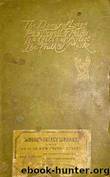Intentions by Oscar Wilde

Author:Oscar Wilde
Language: eng
Format: epub, azw, mobi
Publisher: ManyBooks.net
* * *
THE CRITIC AS ARTIST--WITH SOME REMARKS UPON THE IMPORTANCE OF DISCUSSING EVERYTHING
* * *
A DIALOGUE:
Part II. Persons: the same. Scene: the same.
ERNEST. The ortolans were delightful, and the Chambertin perfect, and now let us return to the point at issue.
GILBERT. Ah! don't let us do that. Conversation should touch everything, but should concentrate itself on nothing. Let us talk about Moral Indignation, its Cause and Cure, a subject on which I think of writing: or about The Survival of Thersites, as shown by the English comic papers; or about any topic that may turn up.
ERNEST. No; I want to discuss the critic and criticism. You have told me that the highest criticism deals with art, not as expressive, but as impressive purely, and is consequently both creative and independent, is in fact an art by itself, occupying the same relation to creative work that creative work does to the visible world of form and colour, or the unseen world of passion and of thought. Well, now, tell me, will not the critic be sometimes a real interpreter?
GILBERT. Yes; the critic will be an interpreter, if he chooses. He can pass from his synthetic impression of the work of art as a whole, to an analysis or exposition of the work itself, and in this lower sphere, as I hold it to be, there are many delightful things to be said and done. Yet his object will not always be to explain the work of art. He may seek rather to deepen its mystery, to raise round it, and round its maker, that mist of wonder which is dear to both gods and worshippers alike. Ordinary people are 'terribly at ease in Zion.' They propose to walk arm in arm with the poets, and have a glib ignorant way of saying, 'Why should we read what is written about Shakespeare and Milton? We can read the plays and the poems. That is enough.' But an appreciation of Milton is, as the late Rector of Lincoln remarked once, the reward of consummate scholarship. And he who desires to understand Shakespeare truly must understand the relations in which Shakespeare stood to the Renaissance and the Reformation, to the age of Elizabeth and the age of James; he must be familiar with the history of the struggle for supremacy between the old classical forms and the new spirit of romance, between the school of Sidney, and Daniel, and Johnson, and the school of Marlowe and Marlowe's greater son; he must know the materials that were at Shakespeare's disposal, and the method in which he used them, and the conditions of theatric presentation in the sixteenth and seventeenth century, their limitations and their opportunities for freedom, and the literary criticism of Shakespeare's day, its aims and modes and canons; he must study the English language in its progress, and blank or rhymed verse in its various developments; he must study the Greek drama, and the connection between the art of the creator of
Download
This site does not store any files on its server. We only index and link to content provided by other sites. Please contact the content providers to delete copyright contents if any and email us, we'll remove relevant links or contents immediately.
| Ancient & Classical | Arthurian Romance |
| Beat Generation | Feminist |
| Gothic & Romantic | LGBT |
| Medieval | Modern |
| Modernism | Postmodernism |
| Renaissance | Shakespeare |
| Surrealism | Victorian |
4 3 2 1: A Novel by Paul Auster(11077)
The handmaid's tale by Margaret Atwood(6876)
Giovanni's Room by James Baldwin(5896)
Big Magic: Creative Living Beyond Fear by Elizabeth Gilbert(4736)
Asking the Right Questions: A Guide to Critical Thinking by M. Neil Browne & Stuart M. Keeley(4600)
On Writing A Memoir of the Craft by Stephen King(4223)
Ego Is the Enemy by Ryan Holiday(4004)
Ken Follett - World without end by Ken Follett(3984)
The Body: A Guide for Occupants by Bill Bryson(3818)
Bluets by Maggie Nelson(3724)
Adulting by Kelly Williams Brown(3682)
Guilty Pleasures by Laurell K Hamilton(3602)
Eat That Frog! by Brian Tracy(3529)
White Noise - A Novel by Don DeLillo(3443)
The Poetry of Pablo Neruda by Pablo Neruda(3372)
Alive: The Story of the Andes Survivors by Piers Paul Read(3322)
The Book of Joy by Dalai Lama(3239)
The Bookshop by Penelope Fitzgerald(3238)
Fingerprints of the Gods by Graham Hancock(3224)
